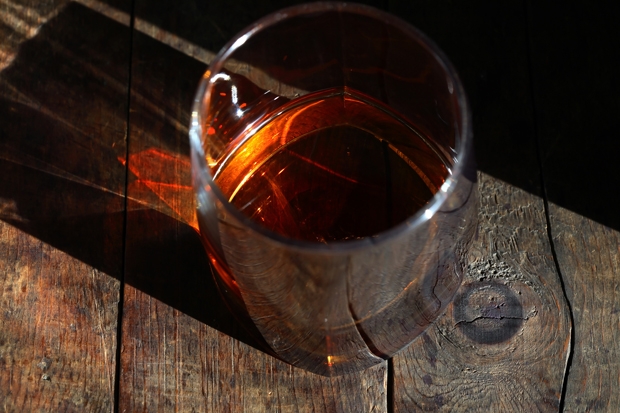Cometh the hour, cometh the book, and so Christmas brings us once again a tidal wave of titles relating to food and drink: cookbooks of seasonal dishes from around the world, never once to be consulted, and endless tomes of wine connoisseurship for all of us dedicated cheapskate consumers of Lidl and Aldi plonk. So the question is: are Thomas Tylston Greg’s Through a Glass Darkly and Henry Jeffreys’s Empire of Booze destined to last any longer than your turkey carcass and your festive case of supermarket Prosecco?
Both books are undoubtedly charming. Through a Glass Darkly is one of those books in the London Library’s ‘Found on the Shelves’ series, in which out-of-copyright curiosities are plucked from the obscurity of the library’s shelves, repackaged and presented as pocket-sized light reads perfect for a long commute or as something to relax with at weekends. At £4.99 they’re an absolute bargain. Other titles in the series include Cycling: The Craze of the Hour; On Corpulence: Feeding the Body and Feeding the Mind and A Woman’s Walk. Designed by Dan Pearson, the books are eye-catching, amusing and strange, like an eccentric aunt or a late-night documentary on BBC2.
Through a Glass Darkly, first published in 1897, is a book of short essays, several of them originating in the pages of the Pall Mall Gazette, each relating to drink — ‘Port’, ‘Sherry’, ‘Glasses’ — and written in the kind of clubbable style which will be familiar to anyone who has ever read the reviews and essays of W.E. Henley or Max Beerbohm.
Not to have a cellar is derogatory to the dignity of man. Yet it is notable that, while every petty clerk or budding draper clamours for a bathroom, not one in a thousand will insist upon his wine vault; and so it comes to pass that Jerry the master-builder squeezes a new-style tepidarium into every one of his vulgar thirty-pounders, and the million which would be clean, but is not, flocks to wash therein.
This style — snobbish, brisk and witty — exists now perhaps only in the fading memories of men and women brought up on Latin, nannies and servants. The chapter on ‘Butlers’, for example, is a reminder of a world long gone:
The trim cap and dainty apron of suburban Phyllis may please and delight some, but, for solid grandeur and substantial splendour, and, it may be added, potential enjoyment, we look solely to those houses whose threshold is guarded and whose portals are opened, by that great emblem of British respectability, the British Butler.
Henry Jeffreys strikes a surprisingly similar and sturdy tone. A self-styled ‘booze blogger’, he sets out to explain the relationship between Britain’s imperial history and the history of various alcoholic drinks: port, obviously, and gin and claret, but also champagne, whisky and beer. He writes with the breezy, pleading tone of an aristo on his uppers. Discussing the ‘natural’ wine movement, for example — wines purportedly made with few if any additives — he dismisses it as a ‘celebration of terroir, of peasants with gnarled hands, of things that smell a bit pooey’. One chapter begins with an Edwardian burble: ‘About ten years ago a friend of mine inherited a country pile near Hull from a misanthropic great uncle.’ There is an obligatory reference to 1066 and All That.
Sweet and fruity and ever-so-slightly floral, Jeffreys nonetheless manages to cover a vast amount of history in great depth, surveying everything from Nelson’s taste for marsala to the rise of the English restaurant in the late 19th century and its customers’ unslakable thirst for champagne, to what he calls the ‘crude tastes of the British’ and its disastrous effect on the production of Australian wines.
Best of all, at the end of each chapter there is a short list of recommendations of drinks that one might sample to complement one’s study of British imperial and alcoholic history. This year at Christmas I will therefore be substituting Gospel Green Sparkling Cider for my supermarket Prosecco, Tanqueray Old Tom — ‘A recreation of the old sweet gin style’ — for the Beefeater, and some Porterhouse Brewing Company Celebration Stout — ‘the kind of beer that Catherine the Great might have enjoyed’ — to revive myself on Boxing Day. Never mind books about drink — a book you can drink, now that’s a Christmas gift.






Comments